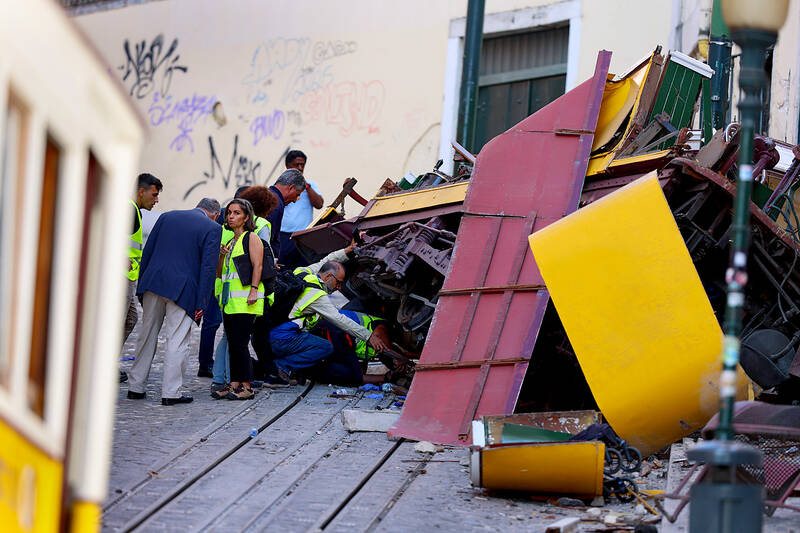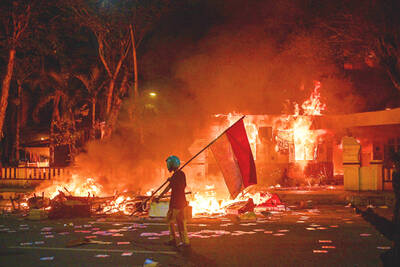Portugal yesterday observed a national day of mourning a day after a Lisbon streetcar derailed and killed 16 people in the capital’s worst crash in recent history.
Authorities had given no information about those killed or the 22 who police said were injured in the incident, raising the initial casualty toll.
The 19th-century streetcar is one of Lisbon’s big tourist attractions and is usually packed with foreigners at this time of year for its short and picturesque trip up and down one of the city’s steep hills.

Photo: EPA
Teams of pathologists at the Portuguese National Forensics Institute, reinforced by colleagues from three other Portuguese cities, worked through the night on autopsies, officials said.
The injured people were admitted to several hospitals in the Lisbon region.
The streetcar’s crumpled wreckage yesterday was still on the downtown road where it crashed, cordoned off by police.
Officials declined to speculate on whether a faulty brake or a snapped cable might have caused the crash.
The yellow-and-white streetcar, known as Elevador da Gloria, was lying on its side on the narrow road that it travels on, its sides and top crumpled. It crashed into a building where the road bends, leaving parts of the mostly metal vehicle crushed.
“It hit the building with brutal force and fell apart like a cardboard box,” resident Teresa d’Avo told Portuguese TV channel SIC.
She described the streetcar as out of control and seeming to have no brakes, and said she watched passersby run into the middle of the nearby Avenida da Liberdade, or Freedom Avenue, the city’s main thoroughfare.
The incident occurred at the start of the evening rush hour, at about 6pm.
Emergency officials said that all of the people inside were pulled out of the wreckage in just over two hours.
The streetcar, technically called a funicular, is harnessed by steel cables and can carry more than 40 people, seated and standing. It is also commonly used by Lisbon residents.
The service, inaugurated in 1885, goes up and down a few hundred meters of a hill on a curved, traffic-free road in tandem with one going the opposite way.
The Lisbon City Council halted operations of three other funicular streetcars in the city while immediate inspections were carried out.

Australia has announced an agreement with the tiny Pacific nation Nauru enabling it to send hundreds of immigrants to the barren island. The deal affects more than 220 immigrants in Australia, including some convicted of serious crimes. Australian Minister of Home Affairs Tony Burke signed the memorandum of understanding on a visit to Nauru, the government said in a statement on Friday. “It contains undertakings for the proper treatment and long-term residence of people who have no legal right to stay in Australia, to be received in Nauru,” it said. “Australia will provide funding to underpin this arrangement and support Nauru’s long-term economic

‘NEO-NAZIS’: A minister described the rally as ‘spreading hate’ and ‘dividing our communities,’ adding that it had been organized and promoted by far-right groups Thousands of Australians joined anti-immigration rallies across the country yesterday that the center-left government condemned, saying they sought to spread hate and were linked to neo-Nazis. “March for Australia” rallies against immigration were held in Sydney, and other state capitals and regional centers, according to the group’s Web site. “Mass migration has torn at the bonds that held our communities together,” the Web site said. The group posted on X on Saturday that the rallies aimed to do “what the mainstream politicians never have the courage to do: demand an end to mass immigration.” The group also said it was concerned about culture,

ANGER: Unrest worsened after a taxi driver was killed by a police vehicle on Thursday, as protesters set alight government buildings across the nation Protests worsened overnight across major cities of Indonesia, far beyond the capital, Jakarta, as demonstrators defied Indonesian President Prabowo Subianto’s call for calm. The most serious unrest was seen in the eastern city of Makassar, while protests also unfolded in Bandung, Surabaya, Solo and Yogyakarta. By yesterday morning, crowds had dispersed in Jakarta. Troops patrolled the streets with tactical vehicles and helped civilians clear trash, although smoke was still rising in various protest sites. Three people died and five were injured in Makassar when protesters set fire to the regional parliament building during a plenary session on Friday evening, according to

CRACKDOWN: The Indonesian president vowed to clamp down on ‘treason and terrorism,’ while acceding to some protest demands to revoke lawmaker benefits Protests in Indonesia over rising living costs and inequality intensified overnight, prompting Indonesian President Prabowo Subianto to cancel a planned trip to China, while demonstrators reportedly targeted the homes of the finance minister and several lawmakers. Rioters entered Indonesian Minister of Finance Sri Mulyani Indrawati’s residence near Jakarta early yesterday, but were repelled by armed forces personnel, Kompas reported. Items were taken from the homes of lawmaker Ahmad Sahroni and two others, according to Detik.com. The reports of looting could not be independently verified, and the finance ministry has not responded to requests for comment. The protests were sparked by outrage over